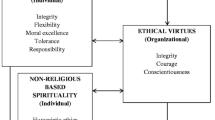Abstract
The purpose of this paper is to investigate the Korean public relations practitioners' perceptions toward ethical issues, individual practices, and ethical standards in the context of ethical ideology. The survey was conducted with the Korean public relations practitioners. A 2 (Relativism: High/Low) × 2 (Idealism: High/Low) factorial design was devised for the analysis.
The MANOVA results showed that ethical ideology (idealism and relativism) had significant effects on ethical decision-making. Idealistic ideology had a main effect on ethical issues, individual practices, and ethical standards. However, relativistic ideology only affected the decision-making process related to ethical issues. No interaction effects were detected. This study indicated that the individual's ethical ideology could be an important variable in explaining the outcomes of the individual's ethical decision-making among Korean public relations practitioners.
Similar content being viewed by others
References
Ali, D. J.: 1995, Societal culture and public relations: A comparative analysis of Trinidad and Antigua, West Indies. Unpublished doctoral dissertation, University of Maryland at College Park.
Ang, S. H. and S. M. Leong: 2000, ‘Out of the Mouths of Babes: Business Ethics and Youths in Asia’, Journal of Business Ethics 28, 129–144.
Barnett, T., K. Bass and G. Brown: 1994, ‘Ethical Ideology and Ethical Judgment Regarding Ethical Issues in Business’, Journal of Business Ethics 13, 469–480.
Baskin, O. W., C. E. Aronoff and D. Lattimore: 1997, Public Relations: The Profession and the Practice, 4th eds. (Brown and Benchmark, Dubuque).
Bivins, T. H.: 1987a, ‘Applying Ethical Theory to Public Relations’, Journal of Business Ethics 6, 195–200.
Bivins, T. H.: 1992, ‘A Systems Model for Ethical Decision-making in Public Relations’, Public Relations Review 18, 365–383.
Bivins, T. H.: 1993a, ‘A Worksheet for Ethics Instruction and Exercise in Reason’, Journalism Educator 48(2), 4–16.
Bivins, T. H.: 1993b, ‘Public Relations, Professionalism, and the Public Interest’, Journal of Business Ethics 12, 117–126.
Cutlip, S. M., A. H. Center and G. M. Broom: 2000, Effective Public Relations, 8th eds. (Prentice-Hall, Upper Saddle River, NJ).
Davis, M.: 1999, ‘Professional Responsibility: Just Following the Rules’, Business and Professional Ethics Journal 18(1), 65–87.
Forsyth, D. R.: 1980, ‘A Taxonomy of Ethical Ideologies’, Journal of Personality and Social Psychology 39, 175–184.
Forsyth, D. R.: 1992, ‘Judging the Morality of Business Practices: The Influence of Personal Moral Philosophies’, Journal of Business Ethics 11, 461–470.
Forsyth, D. R. and J. L. Nye: 1990, Personal Moral Philosophies and Moral Choice’, Journal of Research in Personality 24, 398–414.
Grunig, J. E. and L. A. Grunig: 1996, Implications of Symmetry for a Theory of Ethics and Social Responsibility in Public Relations. Presented to the 222 Yungwook Kim Public Relations Interest Group International Communication Association, Chicago, May 23–27.
Hofstede, G.: 1980, Culture's Consequences: International Differences in Work-related Values (Sage, Newbury Park, CA).
Hofstede, G.: 1991, Cultures and Organizations: Software of the Mind (McGraw Hill, New York).
Hofstede, G. and M. H. Bond: 198, ‘The Confucius Connection: From Cultural Roots to Economic Growth’, Organizational Dynamics 16(4), 4–21.
Kim, K. O.: 1997, ‘The Reproduction of Confucian Culture in Contemporary Korea: An Anthropological Study’, in T. Wei-Ming (ed.), Confucian Traditions in East Asian Modernity (Harvard University Press, Cambridge, MA), pp. 202–227.
Kim, Y.: November 2000, Explaining Public Relations Using Rational Choice Theory: Public Relations Models and Ethics in the Individual Level. Presented at the National Communication Association, New York.
Kim, Y., and Y. Choi: 2001, Ethical Standards and Ideology among Public Relations Practitioners. Unpublished manuscript.
Kim, Y. and L. Hon: 1998, ‘Craft and Professional Models of Public Relations and Their Relation to Job Satisfaction among Korean Public Relations Practitioners’, Journal of Public Relations Research 10(3), 155–175.
Kincaid, D. L.: 1987, Communication Theory: Eastern and Western Perspectives (Academic Press, Sandiego, CA).
Kruckeberg, D. K.: April 1993, ‘Ethical values define public relations community’, PR Update: News Journal of the Public Relations Division of AEJMC, 2, 1–2.
McElreath, M. P.: 1996, Managing Systematic and Ethical Public Relations Campaigns (Brown & Benchmark, Madison, WI).
Newsom, D., J. V. Turk and D. Kruckeberg: 2000, This is PR: The Realities of Public Relations (Wadsworth, Belmont, CA).
O'Dwyer's PR Services Report: December 2000, 'PRSA's new ethics code called ‘Weak’ ”, 35, 39.
Pearson, R. A.: 1989, ‘Albert J. Sullivan's Theory of Public Relations Ethics’, Public Relations Review 15(2), 52–62.
PR Week: May 1, 2000, ‘Liar, Liar, PR on Fire’, 1, 18–19.
Sharmir, J., B. S. Reed and S. Connell: 1990, ‘Individual Differences in Ethical Values of Public Relations Practitioners’, Journalism Quarterly 67(4), 956–963.
Shin, H.: 1997, ‘Media relations and Public Relations Ethics: Evaluating Problems and Suggesting the Analytic Framework’, Korean Journal of Public Relations Research 1(1), 2110–2237.
Shin, H. and H. Cha: 2000, ‘The Need of the Codes of Ethics for the Professionalism of Public Relations in Korea’, Korean Journal of Public Relations Research 4(2), 232–258.
Sriramesh, K. and J. White: 1992, ‘Societal Culture and Public Relations’, in J. E. Grunig (ed.), Excellence in Public Relations and Communication Management (Lawrence Erlbaum Associates, Hillsdale, NJ), pp. 597–614.
Wilcox, D. L., P. H. Ault, W. K. Agee and G. T. Cameron: 2000, Public Relations Strategies and Tactics, 6th eds. (Addison Wesley Longman, New York).
Yum, J. O.: 1987a, ‘Korean Philosophy and Communication’, D. L. Kindaid (ed.), Communications Theory: Eastern and Western Perspectives (Academic Press, San Diego, CA), pp. 71–86.
Yum, J. O.: 1987b, ‘The Practice of Uye-ri in Interpersonal Relationship in Korea’, in D. L. Kindaid (ed.), Communications Theory: Eastern and Western Perspectives (Academic Press, San Diego, CA), pp. 87–100.
Author information
Authors and Affiliations
Rights and permissions
About this article
Cite this article
Kim, Y. Ethical Standards and Ideology Among Korean Public Relations Practitioners. Journal of Business Ethics 42, 209–223 (2003). https://doi.org/10.1023/A:1022281507601
Issue Date:
DOI: https://doi.org/10.1023/A:1022281507601



